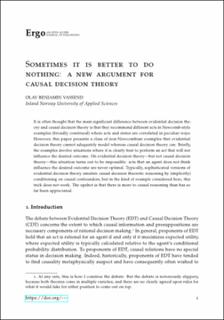Sometimes it is better to do nothing: A new argument for causal decision theory
Peer reviewed, Journal article
Accepted version
Permanent lenke
https://hdl.handle.net/11250/3031440Utgivelsesdato
2022Metadata
Vis full innførselSamlinger
Sammendrag
It is often thought that the main significant difference between evidential decision theory and causal decision theory is that they recommend different acts in Newcomb-style examples (broadly construed) where acts and states are correlated in peculiar ways. However, this paper presents a class of non-Newcombian examples that evidential decision theory cannot adequately model whereas causal decision theory can. Briefly, the examples involve situations where it is clearly best to perform an act that will not influence the desired outcome. On evidential decision theory—but not causal decision theory—this situation turns out to be impossible: acts that an agent does not think influence the desired outcome are never optimal. Typically, sophisticated versions of evidential decision theory emulate causal decision theoretic reasoning by (implicitly) conditioning on causal confounders, but in the kind of example considered here, this trick does not work. The upshot is that there is more to causal reasoning than has so far been appreciated.
